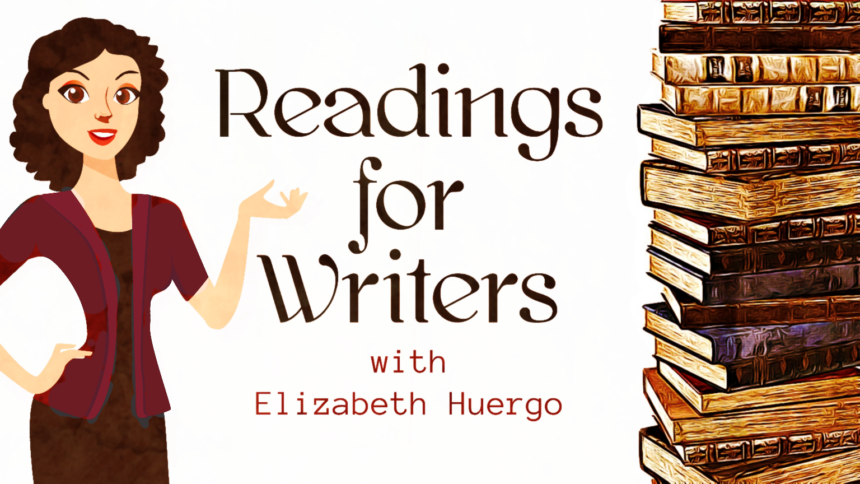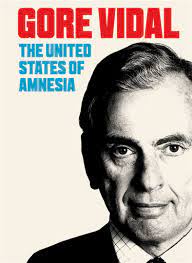Readings for Writers: Amnesiacs Behaving Like Zombies at an Apocalypse
By Elizabeth Huergo | January 30, 2024 |

In a public-school decades ago, I learned early American History from someone who described the arrival of English pilgrims on this continent as a direct fulfillment of God’s will. The Almighty Himself, this teacher told the class, wanted these Europeans to inhabit this second Eden. As for the handful of murderous Calibans who managed to scale the walls of Paradise, the pilgrims could not help bumping into them, which is why we have Thanksgiving.
Obviously, the “c” word was never spoken in this classroom. The pilgrims’ motives, like the motives of the pioneers who later pushed westward across an “empty” terrain, could never be questioned. Their actions could never be referred to as conquest or the will to power, only the godly, progressive unfolding of civilization. The story this teacher told of the Boston Tea Party of 1773 was similarly plumb, square, and solid. The Sons of Liberty boarded ships in Boston Harbor and tossed crates of tea into the sea because “no taxation without representation” was a noble belief for which these patriots were willing to kill and die.
What I remember most about that long-ago classroom is the blank weight of questions I could not form much less express. How did the Sons of Liberty rationalize political violence? Why was their destruction of private property laudable? The ships they boarded, after all, were built in America and owned by Americans. Did the ends justify the means?
There were, too, comparisons across centuries that remained unspoken. For example, how were the Sons of Liberty in 1773 different from the rioters who spilled into the streets after the assassination of Martin Luther King in 1968; or the members of the Clamshell Alliance who demonstrated against the production of nuclear weapons in 1976?
The ships boarded by the Sons of Liberty were trading with the British East India Company. What were the British doing in India, anyway? Was it anything like what the US was doing in its “backyard” (e.g., Cuba, 1961; Brazil, 1964; Bolivia, 1971; Chile, 1973; Argentina, 1976; etc.)? Why, on that December night of the raid, did some members of the Sons of Liberty dress as Indigenous Americans?
The 1773 event was invoked in 2009, when a group of right-wing Republicans formed the Tea Party, taking on the famous moniker without considering who they were emulating or what they were tacitly evoking. Like their earlier comrades, the Tea Party Republicans didn’t like taxes. That was clear, though I remember wanting desperately to interrupt the television pundits and ask them to ask these reactionaries how they felt about level sidewalks and working streetlamps; well-paved roads and well-timed traffic lights; dog parks and snowplows; electrical grids and clean water?
“What will happen next?” the pundits asked one another after each commercial break. Only the future mattered. My mind drifted back to Orwell’s 1984 and the “memory hole,” the chute into which poor Winston tosses bits of reported information, the first draft of written history. Down the chute and into the incinerator went the facts, along with every possibility of understanding the present moment.
People remember Santayana for his aphorism, “[t]hose who cannot remember the past are condemned to repeat it,” which appears in The Life of Reason, a very accessible philosophical tome. The sort of memory Santayana is referring to relies on facts, though what he terms the “profit” of studying history is not the accumulation of facts, the “dead knowledge of what happens to have happened,” but rather “in understanding what has happened, in perceiving the principles and laws that govern social evolution, or the meaning which events have” (italics original).
 Santayana points to a process of understanding that begins, not with a self-serving political interpretation, but a sober assessment of facts. The point of his well-known aphorism is that societies develop meaning, a shared story about the value of what happened, based on facts. Without them, we neither understand nor evolve. Instead, we condemn ourselves to a dissociative fugue, a collective and dangerous state of forgetting. In Gore Vidal’s words, we become “the United States of Amnesia.”
Santayana points to a process of understanding that begins, not with a self-serving political interpretation, but a sober assessment of facts. The point of his well-known aphorism is that societies develop meaning, a shared story about the value of what happened, based on facts. Without them, we neither understand nor evolve. Instead, we condemn ourselves to a dissociative fugue, a collective and dangerous state of forgetting. In Gore Vidal’s words, we become “the United States of Amnesia.”
The events of 1773 and 2009 haunted January 6, 2021, when the US Capitol was stormed in an attempt to derail the peaceful transfer of power.
“It’s unimaginable!” the pundits sputtered. “It’s inconceivable!”
“Naw,” I shouted at the television screen. “It’s the return of the repressed.”
The 2021 assault was not just imaginable and conceivable. It was predictable. That assault drew on assumptions that lay heavy and unquestioned about the selective rationalization of political violence, the refusal to respect collective public spaces, and the unquestioned use of racist tropes (flying the Confederate flag, dressing like a child’s version of a Hollywood “Injun”). The assault was haunted by the cynics of 2009, politicians more interested in power than governance, more intent on manipulation than leadership.
 In Education for Critical Consciousness, Paulo Freire, the Brazilian educator, reflects on democracy. “Before it becomes a political form,” he writes, “democracy is a form of life, characterized above all by a strong component of transitive consciousness. Such transitivity can neither appear nor develop except as [people] are launched into debate, participating in the examination of common problems.” Democracy is a lived practice that depends on a particular habit of mind, one that debates and questions.
In Education for Critical Consciousness, Paulo Freire, the Brazilian educator, reflects on democracy. “Before it becomes a political form,” he writes, “democracy is a form of life, characterized above all by a strong component of transitive consciousness. Such transitivity can neither appear nor develop except as [people] are launched into debate, participating in the examination of common problems.” Democracy is a lived practice that depends on a particular habit of mind, one that debates and questions.
Benjamin Franklin made a similar point in 1787 when Elizabeth Willing Powel asked him what form of government we would have, monarchy or republic. “A republic, if you can keep it,” Franklin responded. Both Freire and Franklin understood that while many forms of government can repress dissent through violence, democracy depends on a questioning habit of mind. It depends on safe, open dialogues where change can be carefully weighed.
For Freire, “transitive consciousness” is the point at which a person begins to question the world. (Consider the etymology of the Latin prefix “trans,” which means to cross or to carry over.) The moment a student shifts from describing what she read to forming a sustained logical argument about what she read is both a transforming moment and a moment of transitive consciousness.
The student reflects on what she read. More important, she begins to reflect on the frame, how the story is told, the implications of that frame, the fact that the frame is a choice made by the author and not an inevitability. She is transiting from facts to interpretation. She is asking, what does the reading mean to me? Here lies the danger of an education that fosters critical thinking, the terror that propels book bans and hate speech and cowardly death threats, the racism that seeks to block any mention of slavery or genocide in the public-school curriculum.
Education carries us across borders. It shatters boundaries and icons. Not for the sake of violence or revenge, but rather for the sake of consciousness, of a life better, more ethically lived. For Freire, the classroom is neither a safe cocoon nor a churning cauldron of indoctrination, radical or reactionary. To paraphrase him, the classroom is coextensive with the world. The practice of democracy depends on co-extensive critical inquiry.
If ever there were a meme for our present age it is amnesiacs behaving like zombies at an Apocalypse. Every headline seems to have been written by a staff writer at The Onion. Every news journalist has metamorphosed into an “infotainer.” Neighbors, without batting an eye, recommend using Facebook to research political candidates or the dangers of a vaccine. To quote the prescient Neil Postman, we are “amusing ourselves to death.”
Suffering in this state of amnesia, a lot of people seem hell bent on eating their own brains. At this point, I have only two recommendations for those who love reading and writing: daily doses of facts and laughter. For the facts, try Heather Cox Richardson’s Letters from an American, which she describes as “a newsletter about the history behind today’s politics.” Cox Richardson, a history professor, pulls together a daily list of notable moments. I read her Substack post every morning and find myself thinking she has curated the first draft of the history of this era.
As for the darkly comic, watch comedian Jordan Klepper practice the Socratic method as he interviews people at political rallies. Watch what those people do when his questions lead them to face the irrationality of what they say they believe. Klepper conducts interviews the way journalists used to do before they became entertainers.
Over to you: As a writer, where do you go for facts and humor? How do you write about history?
[coffee]









Thank you, well said.
Well-stated, well-reasoned.
Fidel has fallen! What a fantastic (also terribly sad) beginning for a story that carries an important lesson about human behavior. I’m looking forward to reading your entire book.
I have read Dr. Richardson’s Letter to Americans every day for the past 3 or 4 years. She helped me understand what was happening every day during the current madness.
The steady processing of insurrectionists through the court system and on to jail, if convicted, and back to sanity (maybe) when they have served their time, is ongoing reassurance that we’re dealing with this event with the system set up for it rather than more random violence and terror.
We’ve lasted this long; let’s hope for more. This year will be a severe test of whether more people will realize casting their vote is the only thing that stands between us and another king/emperor/dictator: huge numbers of citizens carelessly ignore their assigned power at each election.
Wonderful essay and thank you for the links. I write contemporary novels. The characters have differing perspectives on history and life in general. Of course, that finds a way into the story.
In terms of American History (I have a B.A. in History, so bow down), you can seldom go wrong by simply following the money. Even the Pilgrims, so fanatic they were kicked out of England, were members of a speculative investment group. That’s how they managed to buy the Mayflower. Today’s attacks on liberal education and liberal politics (both requiring lots of tax money) are being financed and managed by (very very rich) people who feel that their status as a permanent minority (duh) means they have taxation with no representation. So they want no taxes at all. And no democracy at all would be even better. Simple.
In terms of (my) writing, I have been ignoring recent history. This screaming all-clown circus is making it very difficult to place stories in this era. Trying to focus on supernatural powers or magical characters in the age of you-know-who is creating difficulties. And who feels like spinning tales of faeries? Even Tolkien stopped work on the Ring books during World War Two.
PS: Big thumbs-up for Heather Cox Richardson.
This is a brilliant essay that so deftly pulls back the curtains of denial. Thank you for writing this important perspective on history and what we make or break of it.